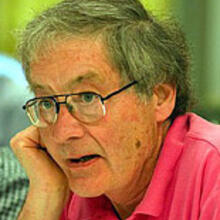Preacher, Icon, Entrepreneur
This is a major book by a major historian of American religion about a major religious figure in American history. Grant Wacker, recently retired from Duke Divinity School, believes that Graham belongs with Dr. Martin Luther King, Jr. and Pope John Paul II, as the three most important religious leaders of the second half of the 20th century. I agree, though a strong case can also be made for Pope John XXIII.
At his zenith in the middle of the last century, Billy Graham ambitioned to make the entire population of America his congregation. He almost succeeded—and that was his nearly fatal flaw. Hence the spike of irony in Wacker’s title for his book.
Graham always thought of himself as an ambassador of Christ for the Kingdom of God. But during the Nixon Administration he also assumed the role of high priest of the American civil religion—a set of hallowed symbols, stories, public rituals and holidays that, as sociologist Robert Bellah argued at the time, united Americans as (in Lincoln’s phrase) “an almost chosen people.”
Billy Graham ambitioned to make the entire population of America his congregation.
Thus, on the Fourth of July, 1970 Graham preached a sermon on loyalty from the steps of the Lincoln Memorial to 400,000 gathered for “Honor America Day”—a rally organized by the Nixon White House—while anti-war protestors shouted from the edges of the Washington Mall. Billy was Nixon’s willing surrogate, not just because he believed God had favored Nixon’s election (in those days he assumed that every U.S. President was divinely forechosen) but also, as Wacker explains, Graham personally abhorred civil discord and disobedience.
At its zenith, Graham’s provenance extended well beyond the Evangelical movement that his ministry defined. In 1970 a Newsweek poll found that more American Catholics looked to Billy for spiritual guidance than to the pope.
Catholic readers, then, will be greatly rewarded by this magnificently written and meticulously researched study of what Billy Graham meant at different times to Americans and what America meant to an evolving Billy Graham.
Graham’s provenance extended well beyond the Evangelical movement that his ministry defined.
As Wacker demonstrates in copious detail, the fundamentalist flame-thrower of the Cold War ‘40s and ‘50s was not the same as the White House chaplain-in-chief of the 1960s and early ‘70s who in turn differs from the politically sobered, more socially conscious and ecumenically engaged world evangelist of his later years. Billy changed as the nation changed. One reason he changed, I believe, is that Graham always liked to be liked. And most people who got to know Graham personally—including those who used him, as Presidents routinely did, and those who judged his sermons and books theologically undernourished, as I did, found it hard not to like the man himself.
Among the scholarly gems that shine in Wacker’s thematic treatment of Graham as preacher, icon, Southerner entrepreneur, architect (of modern Evangelicalism), pilgrim, pastor and patriarch, is his analysis of Billy’s sermon structure and pulpit style. He has fascinating things to say about what prompted listeners to respond to Billy’s crusade altar calls (though there was no altar) and what difference did their “decision for Christ” make on their subsequent lives. (Very often not a lot.) Another gem is Wacker’s analysis of some of the millions of letters Graham received (like letters to Santa, Billy’s arrived at the right place even without an address) seeking advice, and of the answers his writers gave by return mail.
In 1970 a Newsweek poll found that more American Catholics looked to Billy for spiritual guidance than to the pope.
Wacker is by no means an uncritical assessor of the great evangelist’s many faulty judgments. But he is certainly generous in plumbing the many possible reasons for Graham’s most controversial attitudes and responses to, for example, Martin Luther King and the civil rights movement. Graham knew King well enough to call him “Mike,” and as early as 1957 praised him as the leader of “a great social movement.” But Billy refused to march alongside King at Selma. As “America’s pastor” he went to Selma weeks later to help sooth black-white tensions.
I have a few quibbles with Wacker. I think he too readily accepts Graham’s own self-assessment as we find it in his late-in-life autobiography, Just as I Am, which was written (as was much of his other published work) by his staff. In particular, I think he vastly underplays Billy’s behind-the-scenes hand in the concerted last-minute effort by Norman Vincent Peale and other prominent Protestant leaders to prevent John F. Kennedy from becoming the first Catholic president. J.F.K. wasn’t fooled, which is why he was the one president who did not hand Billy the key to the Lincoln bedroom.
One of Wacker’s many revelations is the extent to which Billy ceased to identify as a Baptist in his mature years, feeling more at home within the evangelical wing of the Anglican Church whose writers and theologians—not to mention its low-church liturgy—he greatly enjoyed. And it is worth noting that this onetime Southern fundamentalist who refused to break bread with Jerry Falwell in the 1980s, was the only American Protestant luminary who—with his family—was invited to the funeral of Pope John Paul II. It was a posthumous salute from one world evangelist to another.









